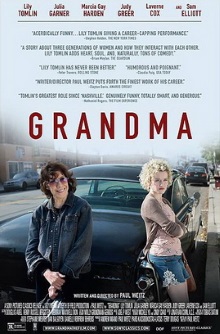
Grandma is one of those tiny, indie films that popped to the top of the lists of best films of 2015. I knew next to nothing about it except that it’s women-centric and is relatively short, meaning that it would be good to slot it in between longer films. It had a budget of less than a million dollars, a pittance by today’s standards, though it managed to gather some fairly respectable star power.
The eponymous grandmother is Elle. Through her interactions, we gather that she is an academic and poet of some renown. One day after arguing with her much younger girlfriend, her granddaughter Sage turns up at her doorstep. As in every mother’s nightmare when her daughter goes to college, Sage is pregnant and doesn’t want her mother to find out. She needs money to get an abortion and so she asks for help from Elle. Unfortunately as an aging leftist feminist, Elle has no regular employment and has just cut up her credit cards as a statement of principle and doesn’t have enough cash. So she goes on a tour of her old friends to raise the money with Sage in tow, along the way renewing frayed relationships and allowing the audience to know more about her past.
The linchpin of the film is of course the character of Elle herself. Irascible, intelligent and in her own way as wise as all grandmothers are reputed to be, she’s what makes this film so entertaining and worth watching as Lily Tomlin plays her to perfection. This is the kind of grandmother who frankly talks about how great sex with her much younger girlfriend is and who doesn’t hesitate to beat up her granddaughter’s boyfriend while being more aware than she lets on about her own mistakes in life. Her crankiness and lack of social decorum as an outspoken lesbian feminist leads to all manner of predictable hijinks, with my favorite scene being how she upsets the peace of a small fashionable coffee shop, to the frustration of a barista played by John Cho. This makes Grandma an effective comedy if nothing else.
One of the oddest things about this film is that it was directed by Paul Weitz, the man who is probably best known for the American Pie series. This was the film that spawned an entire franchise about horny male high-schoolers desperate to lose their virginities and therefore wasn’t exactly very respectful towards women. Grandma on the other hand aces the Bechdel test handily and serves as a showcase for alternative lifestyles in general. One of the first friends Elle reaches out to is a black trans woman and the audience eventually realizes that Elle raised Sage’s mother together with her life-long lesbian partner whose passing a year ago forms the backdrop to many of the events in this film. There are hardly any men at all in this film and even those tend not to be helpful or sympathetic towards Elle and Sage.
In the end, Grandma remains a very light comedy. Its style reminded of the films of Alexander Payne but is even more pleasant and easy-going. Still, while it’s a sentimental film, it’s the good kind of sentimental, being clever, funny and interesting without going overboard on the emotions. Combine this with the girl power aspect and thoughtful treatment of lesbian relationships and it’s a noteworthy film while being entertaining enough for everyone.